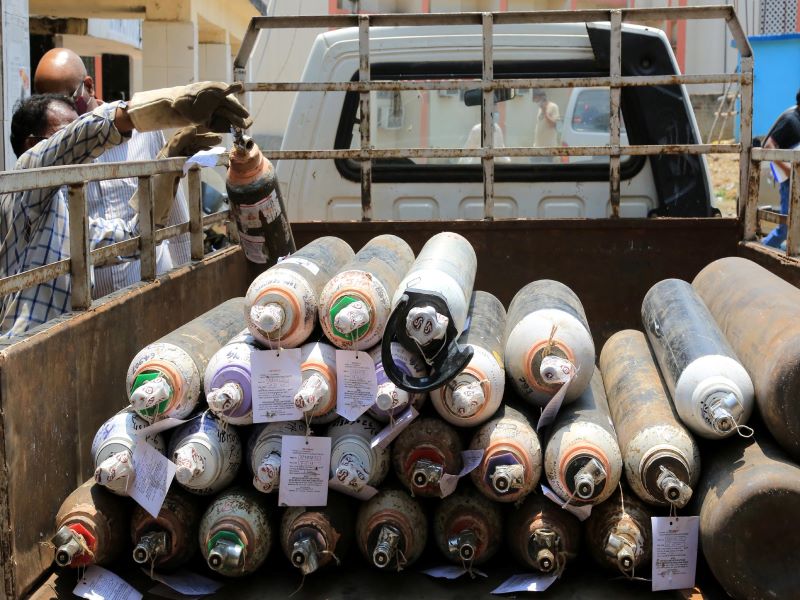 Delhi | Oxygen supply
Delhi | Oxygen supply Inefficiency, failure to store excess stocks, diversion to black market: Centre's study finds in Delhi govt's management of increased oxygen supplies
New Delhi/IBNS: A survey conducted by Central government agencies across 62 major government and private hospitals and 11 oxygen refilling stations in Delhi learned that the oxygen supplied to the city not only failed to reach where it was needed but was also possibly "diverted to black market", Central government sources said, according to an India Today report.
In support of their findings, they pointed out that the Delhi government had shown reluctance in the Supreme Court in allowing the audit of its oxygen requirements, distribution and consumption, the sources said, the report added.
They also said that such diversions of the life-saving gas in Delhi is affecting the supply chain across India.
"Inefficiency in use and diversion reports indicate that oxygen is being diverted to the black market or being hoarded by ministers of the Delhi government themselves," a central government source said, the India Today report stated.
Delhi has been grappling to get alternate storage space in the neighbouring states, especially at the premises of Liquid Medical Oxygen (LMO) manufacturers to store excess supplies, revealed a report by the Petroleum & Explosives Safety Organisation (PESO) North Circle (Ministry of Petroleum and Natural Gas), according to the report.
The study spanned five days and 10 cycles of stock data (for morning and evening) of Liquid Medical Oxygen (LMO) for 45-64 hospitals out of 68 hospitals in Delhi having Liquid Medical Oxygen (LMO) storage tank, said the report. Some of the hospitals included in the survey are Sir Ganga Ram Hospital, Safdarjung Hospital, Batra Hospital, Fortis Shalimar Bagh, AIIMS, Fortis Escorts Heart Institute Okhla.
Daily average consumption of the hospitals included in the survey and their total storage capacity were also collected, it added.
The report was submitted to the Department for Promotion of Industry and Internal Trade (DPIIT), under the Ministry of Commerce, which is coordinating domestic purchases, procurement and supplies needed to battle Covid-19, on May 11, it said.
The report reinforces the Centre's claim that Delhi received an increased amount of oxygen by diverting it from states that were in need of more oxygen. The report stated that Delhi has been returning LMO supplies it received as it lacks storage space.
According to the report, M/s Air Liquide (LMO supplier) said that the Delhi government took only 150 MT of LMO on May 10 from their plants at Panipat and Roorkee while the allocated quota of 190 MT.
Further, Delhi government also made an e-mail request to M/s Air Liquide thnot to release 42 MT of LMO from Panipat and 20 MT from Roorkee plant and instead keep them in their storage tanks.
Keeping with Delhi government's request, Air Liquide Panipat stored 38 MT of LMO in their tanks on May 10 and assured to store 62 MT from May 11, India Today TV report stated.
Government sources stated, May 10 data revealed that Delhi stored an excess of 38 MT of LMO at Air Liquide Panipat plant, 37 MT in storage tanks of INOX Surajpur plant and 37.5 MT in re-fillers storage tanks, the report added.
The PESO has concluded in the survey that the average LMO supply to Delhi has been 529.5 MT in the last 10 days compared to the demand of 700 MT.
The study inferred during 10 cycles of study in these hospitals that LMO stock ranged from 309 MT (48% of total storage capacity) on May 6 morning to 477 MT (67%) on May 10 morning.
"It was also observed that LMO stock with re-fillers varied from 39%-74% of their total storage capacity," the report said.
According to the India Today report, the survey concluded:
On May 8, M/s Linde reported a shortfall in supply as supply from their eastern sector plants was delayed.
On May 9, the shortfall in LMO supply was caused as the Delhi government did not accept 74 MT of LMO to the Linde's Faridabad plant as it had no space in the LMO storage tanks.
Again, a shortfall in the supply from JSW, Jharsuguda, was caused as the Delhi government could not lift the allocated LMO from their plant.
M/s MG Goel Gases said the shortfall was caused as there was not enough space in the storage tanks in the hospitals of Delhi, leading to an increase in the turnaround time of tankers and they were unable to deliver the supplies on time.
"It appears from the above facts that excess LMO allocation and the state's inability to even store it was hampering the smooth supply of LMO from manufacturers and resulting in an increase of turnaround time due to under use of tankers available for transport of LMO," the report said.
Support Our Journalism
We cannot do without you.. your contribution supports unbiased journalism
IBNS is not driven by any ism- not wokeism, not racism, not skewed secularism, not hyper right-wing or left liberal ideals, nor by any hardline religious beliefs or hyper nationalism. We want to serve you good old objective news, as they are. We do not judge or preach. We let people decide for themselves. We only try to present factual and well-sourced news.







